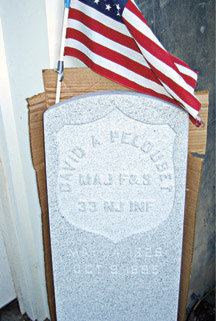The Civil War still resonates in Hudson County in 2011, 150 years after it began. In the Historic Jersey City and Harsimus Cemetery and Memorial Park on Newark Avenue, Jersey City native James Madden sees reminders of the conflict on the 300 gravestones of soldiers who served in the various Union forces. And the memory of the war is also present on the Soldier’s Monument that has stood in Stevens Park on Hudson Street in Hoboken since 1888, with the inscription: “Erected by The Citizens of Hoboken In Memory of Their Fallen Heroes 1861 – 1865.”
300 Civil War soldiers are buried in the Historic Jersey City and Harsimus Cemetery.
________
Madden, a St. Peter’s Prep and St. Peter’s College graduate, first became interested in the Civil War when a college friend brought him to a Civil War re-enactment. Now, 150 years later the public, like Madden, is learning more about Hudson County’s involvement in the bloodiest war ever fought on U.S. soil. Over 88,000 soldiers from New Jersey took part in the war and at least 6,000 lost their lives.
Besides Harsimus Cemetry, there are other local graves that attest to New Jersey’s involvement.
Those who are gone
In Flower Hill Cemetery in North Bergen lies the grave of Decatur Dorsey.
Dorsey was not just an African-American who fought in the Civil War in the 39th United States Colored Infantry Regiment, but he was one of 87 African-American Medal of Honor recipients in U.S. history. The Medal of Honor is the U.S. military’s highest decoration.
Dorsey, whose achievement Madden called “amazing,” was honored for his actions at the Battle of Crater in northern Virginia. He died in 1891 in Hoboken at the age of 55.
And then there’s Maj. David Peloubet, buried at the Harsimus Cemetery in 1895. Peloubet served in the 33rd New Jersey Infantry, which saw action from 1863-1865. Little was known about him, according to Eileen Markenstein, president of the Board of Trustees for the cemetery, when a Civil War enthusiast from Staten Island came to the cemetery in 2008 to verify if Major Peloubet was buried there.
Then came a discovery few months later that Markenstein called a “miracle.” Cemetery volunteers cleaning up an office found a letter from President Abraham Lincoln honoring Peloubet for his service.
Since then, the cemetery has created a monument in Peloubet’s honor. And plans are underway to have a celebration sometime in the spring honoring the Civil War soldiers buried there, around the anniversary of the war’s start of April 1861.
“I am so proud and honored to be a caretaker of these men who served their country,” Markenstein said.
Lost money and mayoral murder
Madden is a contributor to an upcoming book on New Jersey’s contribution to the Civil War. His emphasis is on Hudson County, with some fascinating lowlights.
Edmund Carpenter, the mayor of Hudson City – which consisted of what are now Journal Square and the Heights section of Jersey City – died on Thanksgiving Day 1861 from injuries suffered in a riot started by drunken Union soldiers.
Also, Mayor Orestes Cleveland of Jersey City lost $126,000 of the city’s money (present day value $3.4 million) in 1865 to a “bounty broker” who was supposed to help the city recruit soldiers for the war but who ran off with the cash instead. Cleveland served as mayor until 1867, then won election to the U.S. Congress, followed by another term as Jersey City’s mayor.
For more on the Civil War, as commemorated in New Jersey, visit www.njcivilwar150.org or e-mail: njcivilwar@aol.com
Ricardo Kaulessar can be reached at rkaulessar@hudsonreporter.com.
